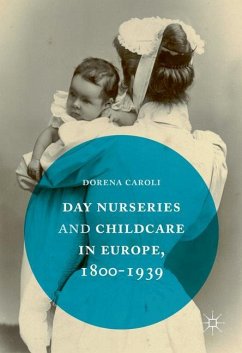This book traces the birth and evolution of the crèche in France, England, Germany, Russia and Italy from the mid-nineteenth century to the eve of the Second World War, in an attempt to understand from a transnational viewpoint the history of an institution for very young children that was very different from what we know today. These institutions had the two-fold goal of combatting the two phenomena that had for centuries characterised the history of infancy - infant mortality and the abandonment of babies. Drawing on a wealth of printed sources and in the light of the most recent and authoritative historical investigations, Dorena Caroli discusses the origins of the first crèche, established in Paris in 1844 by Firmin Marbeau, going on to compare and contrast the reception of the French model of care and assistance for babies and infants in a number of different European countries - England, Germany, Russia and Italy. This book fills a significantlacuna in the studies of infanthistory and the educational institutions designed for infants, providing a clear and broad picture not only of the practices followed but also of the evolution of "puericulture" and medical theories about very young children held in Europe in the nineteenth and twentieth centuries. It represents not only a valuable contribution to the history of these institutions but also a useful manual for students in the field of infant care.
"Dorena Caroli's Day Nurseries and Childcare in Europe 1800-1939, a revised and deftly translated version of her 2014 monograph Per una storia dell'asilo nido in Europa, offers an ambitious contribution to the burgeoning field of transnational studies in the history of early childhood education (ECE) and care. In it, Caroli describes the origin, spread and evolution of day nurseries - welfare institutions for the care of babies - in France, Italy, England, Germany and Russia." (Kristen D. Nawrotzki, History of Education, March, 11 , 2019)
"Day Nurseries & Childcare in Europe offers the readers great insights into the international history of these infant institutions, and an overview which makes this book relevant for student training for work in infant or preschool institutions. ... this book provides an excellentbasis for further research into comparative and transnational history of day nurseries." (Johannes Westberg, IJHE International Journal for the Historiography of Education, Vol. 8 (1), 2018)
"Day Nurseries & Childcare in Europe offers the readers great insights into the international history of these infant institutions, and an overview which makes this book relevant for student training for work in infant or preschool institutions. ... this book provides an excellentbasis for further research into comparative and transnational history of day nurseries." (Johannes Westberg, IJHE International Journal for the Historiography of Education, Vol. 8 (1), 2018)








